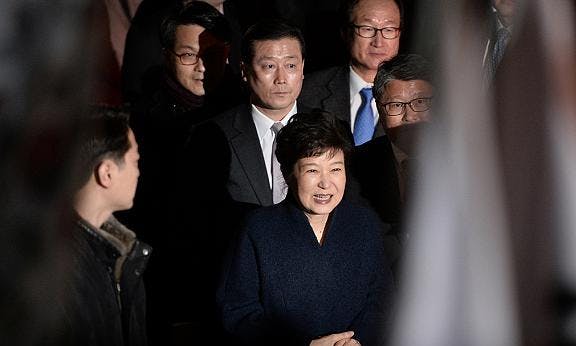The fall of Park Geun-hye

On 11 March, more than 700,000 South Koreans once again took to the streets in anti-government rallies, this time celebrating the ratification of president Park Geun-hye’s impeachment.
The previous day, eight Constitutional Court judges announced that they would unanimously uphold the 9 December vote by the National Assembly to impeach Park. According to chief justice Lee Jung-mi, Park had committed “acts that violated the constitution and laws”.
The victory, however, belongs to ordinary South Koreans. Since October 2016, millions of South Koreans, led by the trade unions and civil society groups, have protested every Saturday. They have demanded that Park be held to account for her role in a massive and still growing corruption scandal involving her administration and some of the biggest corporations in the country.
On 24 October, Korean cable news network JTBC revealed that it had found a tablet PC belonging to Park’s long-time confident Choi Soon-sil. The unsecured device contained presidential briefs for cabinet meetings, appointment schedules for Park and her aides, and 44 presidential speeches that had been edited by Choi, who held no official position in Park’s administration.
Choi repeatedly used her relationship with Park for personal gain, including obtaining more than A$91 million in donations via a variety of foundations, which were then allegedly siphoned off for personal use. As the scandal unfolded, some of South Korea’s biggest chaebol corporations (state-backed family-run conglomerates), such as Samsung, LG and Hyundai, were called before the National Assembly and the Constitutional Court to answer questions about their relationship with both Park and Choi.
On 17 February, the head of Samsung Electronics, Lee Jae-yong, was arrested for allegedly paying A$50 million in bribes to Choi for presidential favours.
At their peak in November and December, the street rallies against Park and those involved in the corruption scandal drew close to 2 million people. Even after the National Assembly voted in early December to begin the impeachment process, South Koreans continued to fill the streets into January and February, with hundreds of thousands coming out each weekend to demand the Constitutional Court remove Park from the presidency.
Even before the October scandal, massive anti-government protests had been held for almost two years. After coming to office in 2013, Park, who is the daughter of former military dictator Park Chung-hee, had reintroduced some of her father’s authoritarian practices.
Using national security laws from 1948, she jailed opposition lawmakers, along with hundreds of trade unionists, while cracking down on labour and anti-government protests. Park also sought to rewrite history by reintroducing government-issued textbooks that whitewashed her father’s human rights abuses.
The protests before and after the October scandal were also fuelled by outrage at Park’s bungled handling of the Sewol ferry tragedy, in which 304 people lost their lives. Most were high school students on a school field trip. Park went to ground for seven hours as the ferry sank, and she failed to explain where she was during the bungled rescue attempt. She made repeated attempts to stall and then prematurely end a full inquiry into the crony capitalism surrounding the ferry disaster. Her actions outraged and politicised South Koreans, including middle and high school students, who took to the streets in their tens of thousands.
Opinion poll results released the day after the Constitutional Court’s ruling show that 86 percent of South Koreans agreed that Park should be impeached. But the ex-president has remained defiant. Park’s supporters, who turned violent after the court ruling, have vowed to continue to support her.
The fall of Park, however, has invigorated the South Korean labour and social movements. Workers and students are saying that this is a “new beginning” for the struggle for both workers’ and social rights. While joyous protesters celebrated Park’s fall on 11 March, they continue to demand Park’s arrest, along with that of acting president Hwang Kyo-ah, and are demanding that the power of chaebol corporations be restricted.